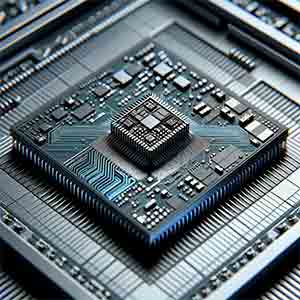Photonic semiconductor chips offer several significant advantages for use in data centers and cars, stemming from their unique properties that differ from traditional electronic semiconductor chips.
-
Higher Speeds: Photonic chips use light (photons) instead of electrical signals (electrons) for data  transmission. This allows for much faster data transfer rates. In data centers, this translates to quicker processing of vast amounts of data, which is crucial for cloud computing, big data analytics, and streaming services. In cars, especially autonomous or connected vehicles, faster data processing can improve reaction times in critical systems, enhancing safety and performance.
transmission. This allows for much faster data transfer rates. In data centers, this translates to quicker processing of vast amounts of data, which is crucial for cloud computing, big data analytics, and streaming services. In cars, especially autonomous or connected vehicles, faster data processing can improve reaction times in critical systems, enhancing safety and performance.
-
Lower Energy Consumption: Photonic chips are more energy-efficient than electronic chips. They generate less heat, reducing the energy required for cooling systems. This is particularly beneficial in data centers, which consume large amounts of energy for both operation and cooling. In electric cars, reduced energy consumption for data processing can lead to longer battery life and extended range.
-
Reduced Latency: The speed of light in optical fibers is significantly higher than the speed of electricity in metal wires, leading to reduced latency in photonic chips. This is crucial in data centers for time-sensitive tasks like high-frequency trading or real-time analytics. In automotive applications, reduced latency can improve the response time of vehicle systems, essential for safety in autonomous driving scenarios.
-
Increased Bandwidth: Photonic chips can handle more data at once compared to electronic chips. This increased bandwidth capability is beneficial in data centers to manage the growing demands of internet traffic, cloud services, and the Internet of Things (IoT). For cars, this means the ability to process more sensor data simultaneously, crucial for advanced driver-assistance systems (ADAS) and autonomous driving technologies.
-
Reduced Electromagnetic Interference (EMI): Since photonic chips use light rather than electrical signals, they are not susceptible to EMI. This makes them more reliable and secure, which is critical in data center environments where EMI can cause data corruption. In automotive applications, this results in more reliable performance of electronic systems, particularly in dense urban environments with many competing signals.
-
Scalability and Integration: Photonic chips can be easily integrated with existing semiconductor technologies, making them scalable for different applications. In data centers, they can be integrated into existing infrastructure to enhance performance. Similarly, in automotive applications, they can be integrated into existing vehicle electronic systems without extensive redesign.
In summary, photonic semiconductor chips offer faster speeds, lower energy consumption, reduced latency, increased bandwidth, reduced electromagnetic interference, and scalable integration, making them highly advantageous for use in both data centers and automotive applications. These benefits align well with the growing demands for efficiency, speed, and reliability in our increasingly connected and data-driven world.

 transmission. This allows for much faster data transfer rates. In data centers, this translates to quicker processing of vast amounts of data, which is crucial for cloud computing, big data analytics, and streaming services. In cars, especially autonomous or connected vehicles, faster data processing can improve reaction times in critical systems, enhancing safety and performance.
transmission. This allows for much faster data transfer rates. In data centers, this translates to quicker processing of vast amounts of data, which is crucial for cloud computing, big data analytics, and streaming services. In cars, especially autonomous or connected vehicles, faster data processing can improve reaction times in critical systems, enhancing safety and performance.